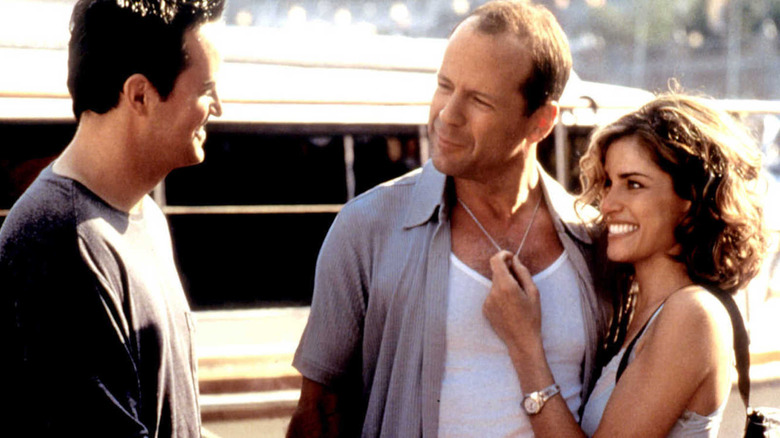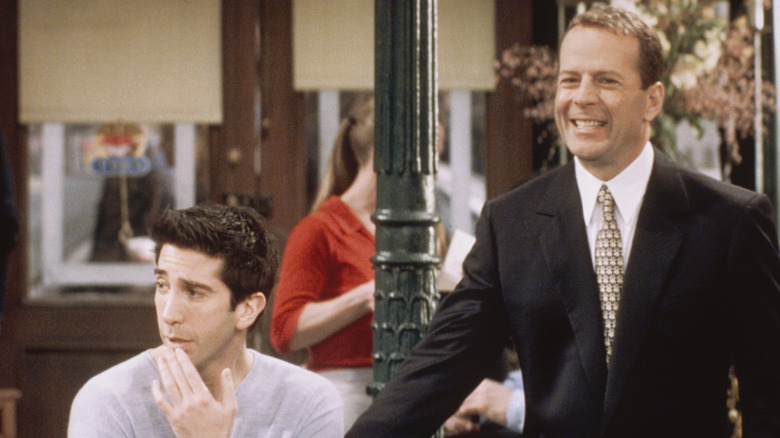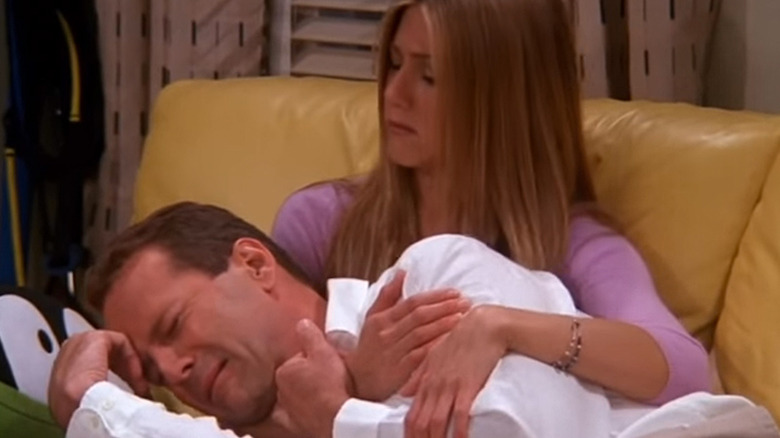How A Bet With Matthew Perry Led To Bruce Willis Winning An Emmy
We may receive a commission on purchases made from links.
Jonathan Lynn's "The Whole Nine Yards" brought Bruce Willis and Matthew Perry together at two very different junctures in their careers. Willis, at 45 years old, was one of the biggest stars on the planet, and hotter than ever thanks to his celebrated performance in M Night Shyamalan's "The Sixth Sense." Perry, at 31 years old, was a television superstar thanks to his portrayal of Chandler Bing on NBC's "Friends," but he had yet to attain big-screen success (which is going to happen when you're getting stuck in uninspired projects like "Fools Rush In," "Almost Heroes" and "Three to Tango").
Perry needed a hit. Willis just needed to keep using his box office clout to land one decent-sized hit a year.
Mitchell Kepner's screenplay for "The Whole Nine Yards" was the epitome of a studio programmer. A mismatched buddy comedy about a neurotic dentist (Perry) who unexpectedly crosses paths with a notorious Chicago gangster (Willis), it coasts on the charm of its leads. Perry proved he could hold his own opposite a bonafide movie star — though, really, the film is most memorable nowadays (to the extent that it is remembered at all) for Amanda Peet's scene-stealing performance as Perry's dental assistant.
Conceptually, "The Whole Nine Yards" is pretty limp. It plays like a mash-up of Herbert Ross' "My Blue Heaven" and Harold Ramis' "Analyze This." Willis sensed this, and wasn't shy about saying so; Perry, perhaps because he desperately needed this film to connect with mainstream moviegoers, disagreed with his co-star. The latter's faith in this relentlessly formulaic contraption wound up being a boon for his sitcom and Willis' trophy shelf.
A wager with no losers
Willis is a notoriously ornery customer if he's working on a movie that isn't working (especially when it's directed by an in-over-his-head Kevin Smith). But Perry, according to his book "Friends, Lovers and the Big Terrible Thing: A Memoir," hit it off with the megastar. It helped that they could carouse together, but Perry was quick to note that their appetites were not the same. According to Perry:
"There was a big difference between Bruce and me. Bruce was a partier; I was an addict. Bruce has an on-off button. He can party like crazy, then get a script like 'The Sixth Sense' and stop the partying and nail the movie sober. He doesn't have the gene — he's not an addict."
Nevertheless, they bonded. Per Perry:
"Sometimes, at the end of the night, when the sun was just about to come up and everyone else had gone, and the party was over, Bruce and I would just sit and talk. That's when I saw the real Bruce Willis — a good-hearted man, a caring man, selfless. A wonderful parent. And a wonderful actor. And most important, a good guy."
Perhaps it was during one of those dawn huddles that Willis expressed his dissatisfaction with the film they were shooting together. He didn't think it would work. Perry did. And so they made a bet: if "The Whole Nine Yards" was a hit, Willis would have to do a guest spot on "Friends." The modestly budgeted comedy made $106 million worldwide, and Willis was a man of his word.
A return to TV comedy form for Bruce Willis
In 2000, Willis did a three-episode run on "Friends" as Paul Stevens, the father of a girl Ross Geller (David Schwimmer) dated in college. Throughout his brief arc, Stevens sets off romantic sparks with Jennifer Aniston's Rachel Green.
Willis, a one-time TV icon via his portrayal of wise-cracking detective David Addison on Glenn Gordon Caron's "Moonlighting," had returned to the medium a few times since becoming a movie star, but the roles (on shows like "Roseanne," "Mad About You" and "Ally McBeal") were generally glorified cameos. He showed up, winked at the viewer, and darted back to a film set.
On "Friends," Willis bought all the way in. He instantly meshed with the core six actors and reminded us that, when the material is up to snuff, he's one of our finest comedic performers. He had a ball, and, when he exited, left us wanting so much more. In doing so, he won a Primetime Emmy for Outstanding Guest Actor in a Comedy Series, his second piece of Emmy hardware since taking home the 1987 Outstanding Lead Actor in a Drama Series trophy for "Moonlighting."
And this would've never happened had Perry, who passed away far too soon this week at the age of 54, failed to stick up for the commercial prospects of "The Whole Nine Yards." Tragically, we've probably seen the last of Willis as an actor as well due to his devastating diagnosis of frontotemporal dementia. Cherish these people while they're here because tomorrow is a promise to no one.


